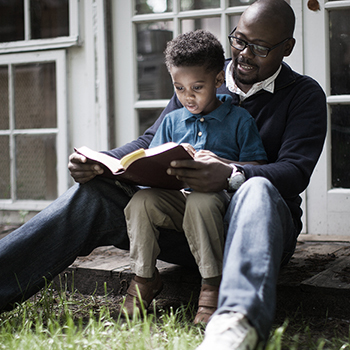
At this writing, my only son turned five years old last week. He is a handsome, articulate, energetic, intelligent, fun-loving, and gentle young man. He is the apple of my eye! There's only one problem in America's view; he is Black.
And as his father, I am challenged to do for him what generations of African American fathers have had to do for their sons for far too long in this country; I must inform him that because of his unique blend of gender and pigmentation, he must contend with a different set of rules while growing up.
Nineteen years ago, on a frigid December night in Waco, Texas, what was intended to be a quick stop at the convenience store turned into a two-hour lesson on the racial history of America. I was a teenager wearing a large jacket with a hood. As I readied myself to exit the car, my grandfather, whom we were visiting for the holidays, proclaimed, "Take that hood off your head before you go in that store, or they will blow your brains out!” Such sudden outbursts were uncharacteristic for my rather mild-mannered grandfather.
His proclamation of the possibility of my abrupt and violent end upset me. And it was difficult for me to comprehend. I was simply going to buy some sodas—the opposite of anything hostile.
For what felt more like an eternity than two hours, my grandfather, grandmother, mother, and uncle reminded me of these troubling realities: (1) that my dark skin, then embracing a five-feet-ten-inch, thirteen-year-old-frame, was a considerable threat for some people, and (2) that some people would not be patient enough to judge me based on the content of my character but rather would be fixated on the color of my skin, and that the color of my skin, viewed through the lens of prejudice, meant that I was the physical embodiment of their greatest fear (a big Black man), a fear reinforced daily by mass media. Ever since that fateful December night, I have lived life in full knowledge of these realities.
Having added over five inches and one hundred pounds to that thirteen-year-old frame over the years, I have learned to give quick and easy smiles when riding in elevators to disarm fellow passengers and to assure them that they’re not in imminent danger. I am mindful of my tone and the inflection of my voice when conversing in multicultural groups—as I have learned that I cannot afford to use the same terms of conversation as others. For if I slightly raise my voice, instead of describing me as passionate some will label me an angry Black man. Like countless generations of men with darker skin and different features, I have been followed while shopping in stores and stopped by police so many times without cause that I am pleasantly surprised when these everyday occurrences do not happen.
Now I, a latter-generation Gen-Xer, must pass down to my postmillennial son some of the rules of engagement for a “Black man” in this society:
I must inform my son that on account of the color of his skin even if he graduates with high honors from an Ivy League law school, serves as the editor of that prestigious school’s law review, and goes on to be elected the president of the United States of America some people will consider him unqualified for the job and question whether he is a ''true'' American. …
I will take part in this familiar yet painful ritual, for as the apostle Paul articulated to his sons and daughters in the faith, I would not want my son “to be unaware … of the affliction we experienced” (2 Cor. 1:8).
Then I will tell my son, “Go and change the world!”
Michael W. Waters is founding pastor of Joy Tabernacle African Methodist Episcopal Church in Dallas, Texas. As pastor, preacher, professor, author, motivational speaker, and community organizer, his words of hope and empowerment have inspired national and international audiences.
From Freestyle: Reflections on Faith, Family, Justice, and Pop Culture by Michael W. Waters. Copyright © 2014 by the author. Used with permission of Upper Room Books.
For a growing list of resources for the spiritual work of overcoming racism, click here.